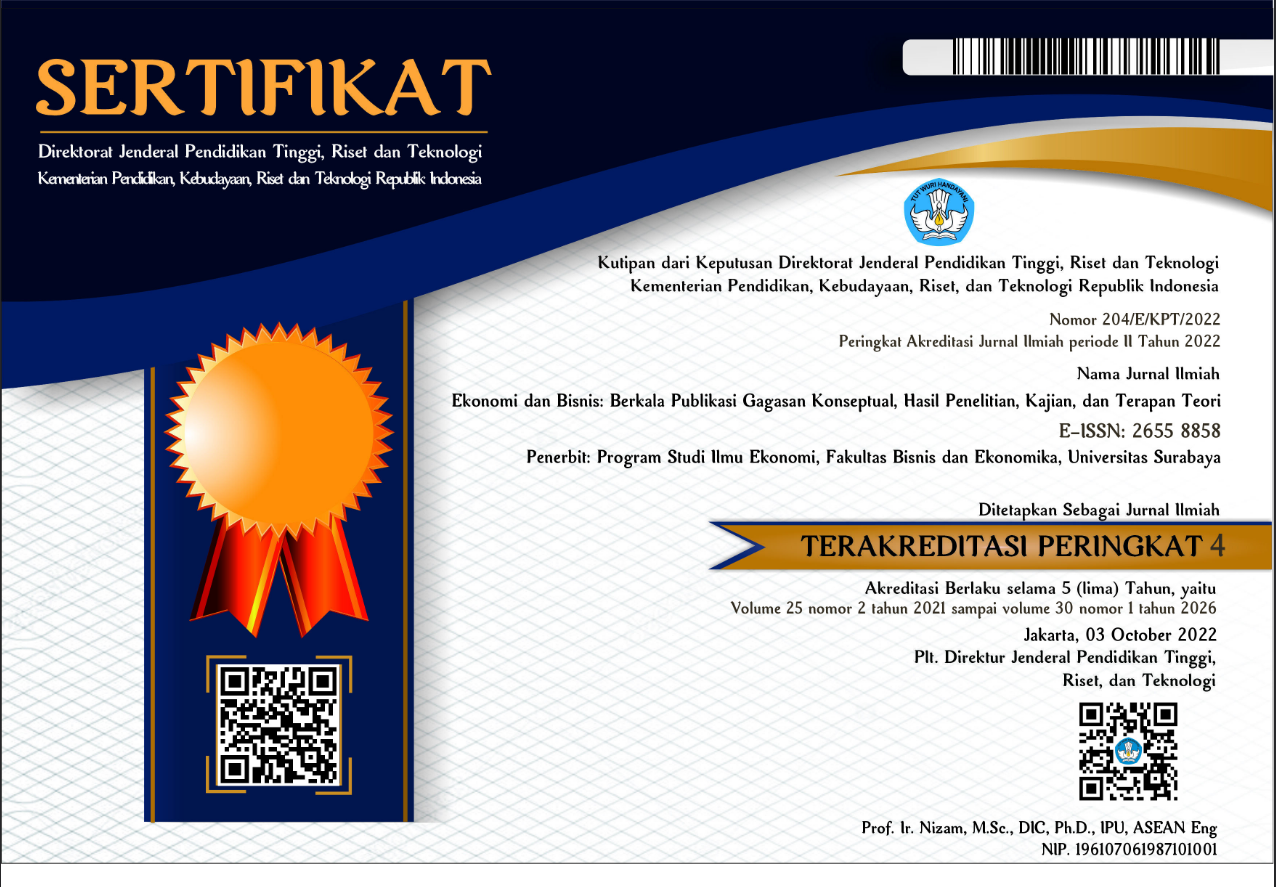PENGARUH HIGH PERFORMANCE WORK ENVIRONMENT TERHADAP EMPLOYEE ENGAGEMENT FEELING & BEHAVIOR GENERASI MILENIAL
 Abstract Views:
468 times
Abstract Views:
468 times
 Prasetyanto & Darmasetiawan (Bahasa Indonesia) Downloads:
500 times
Prasetyanto & Darmasetiawan (Bahasa Indonesia) Downloads:
500 times
Abstract
Human Resources as the driving force of a company is one of the most important assets that need to consider. Therefore, it is of utmost importance to have employee engagement to minimize the turnover rate in the company. A supportive and conducive work environment is one factor in the formation of employee engagement. This research was conducted to see the effect of a high-performance work environment on employee engagement feelings and employee engagement behavior among millennials. This is due to the abysmal engagement rate of millennial employees, which can affect the companies turnover rate. The respondents of this study are millennials aged 22-38 years and have a minimum working period of 2 years in state-owned and private companies. This study uses a quantitative approach that uses the SEM method for data processing. The results are that a high-performance work environment has a significant positive effect on employee engagement with a critical ratio value of 4.651. Employee engagement feeling has also significantly positively affected employee engagement behavior with a critical ratio of 5.727. Based on the results of this research, the company can implement a work environment that facilitates the needs of the millennials so that it can reduce the turnover rate
Downloads
References
Ali, H. (2021, Agustus 30). Indonesia Gen Z and Millenial Report 2020. Retrieved from: Alvara-strategic.com/Indonesia-gen-z-and-millenial-report-2020/
Amstrong, M. (2017). Handbook of Human Resource Management Practice. Thirteenth Edition. London: Kogan Page.
Anderson, E., Buchko, A. A., & Buchko, K. J. (2016). Giving negative feedback to Millennials: How can managers criticize the “most praised” generation. Management Research Review, 39(6): 692–705. doi: https://doi.org/10.1108/MRR-05-2015-0118
Apriyono, A. (2019, November 1). Riset: Tingkat Kesetiaan Karyawan Generasi Milenial Paling Rendah. Retrieved from: https://www.liputan6.com/lifestyle/read/2854466/riset-tingkat-kesetiaan-karyawan-generasi-milenial-paling-rendah
Ardiansyah, N.I & Darmasetiawan N.K. 2019. “Psychological Well-Being and Work Place Relation Gaps on Generational Differences.” dalam Proceeding of 16th International Symposium on Management (INSYMA 2019). Atlantis Press : Advance in Social Science and Humanities Research Volume 308
Badan Pusat Statistik. (2019, November 01). Statistik Gender Tematik: Profil Generassi Milenial Indonesia. Retrieved from: kemenpppa.go.id/lib/uploads/ list/9acde-buku-profil-generasi-milenia.pdf
E. Mujiasih. 2015. Hubungan Antara Persepsi Dukungan Organisasi (Perceived Organizational Support) dengan Keterikatan Karyawan. Jurnal Psikologi 14(1): 40-51
Isyandi, B. 2004. Manajemen Sumber Daya Manusia dalam Perspektif Global. Pekanbaru: Unri Press
Kapoor, C., & Solomon, N. 2011. Understanding and Managing Generational Differences in the Workplace. Worldwide Hospitality and Tourism Themes. 3 (4): 308-318.
Macey, Schneider, Barbera, Young. 2009. Employee Engagement, Tools for Analysis, Practice, and Competitive Advantage. UK: John Wiley & Sons
Mc.Clear, Sheila. (2022, Februari 02). Millennial and Gen Z WorkersHave Low Job Satisfaction and Really Want Rewards and Prizes. The Ladders. Retreved from: https://www.theladders.com/career-advice/millennial-and-gen-z-workers-have-low-job-satisfaction-and-really-want-rewards-and-prizes
Myers, K., & Sadaghiani, K. 2010. Millenials in the workplace: A communication perspective on millennials’ organizational relationships and performance. Journal of Business and Psychology, 25(2): 225-238
Prasetyanto, A. P. & Darmasetiawan N. K. 2020. “The High Performance Work Environment and Employee Engagement on Millenials Generation Working at Green Business Organization” dalam ICFBE 2020 : International Conference on Family Business and Entrepreneurship 2020. President University.
Prihantoro, A. 2015. Pengaruh Motivasi Kerja, Disiplin Kerja, Lingkungan Kerja dan Komitmen terhadap Kinerja Karyawan. Jurnal EMBA. 2(3)
Setiyani, A., Djumarno., Riyanto S., & Nawangsari, L. (2019). The Effect Of Work Environment on Flexible Working Hours, Employee Engagement and Employee Motivation. International Review of Management and Marketing. 9: 112-116
Simanjuntak & Payaman J. 2003. Produktivitas Kerja Pengertian dan Ruang Lingkupnya. Jakarta: Prisma
Thomas, C. H. 2007. “A New Measurement Scale for Employee Engagement: Scale Development, Pilot Test and Replication” dalam Academy of Management Proceedings. pp. 1-6
Tolbize. 2008. Generation differences in the workplace research and training center on community living. University of Minnesota.
Wong, M., Gardiner, E., Lang, W., & Coulon, L. 2008. Generational differences in personality and motivation. Journal of Managerial Psychology. 23 (8): 878-890

 DOI:
DOI:















